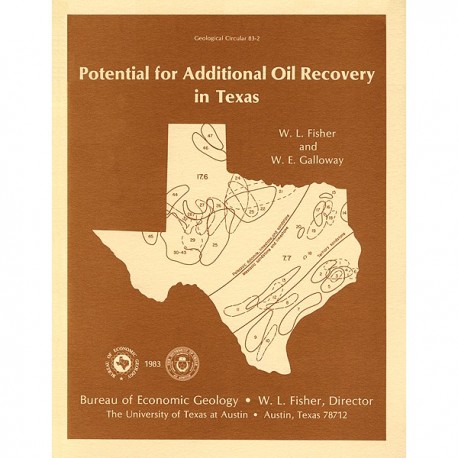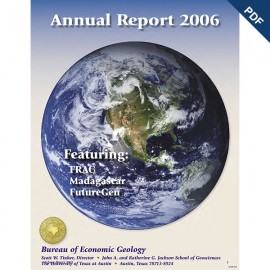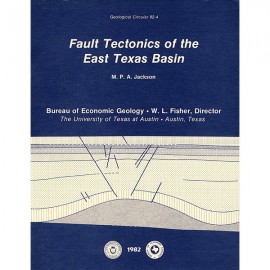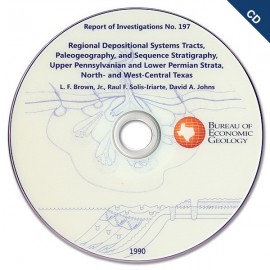Geological Circulars
-
Books & Reports
- Reports of Investigations
- Guidebooks
- Udden Series
- Geological Circulars
- Down To Earth
- Atlases of Major Oil and Gas Reservoirs
- Texas Memorial Museum Publications
- Environmental Geologic Atlas of the Texas Coastal Zone
- Mineral Resource Circulars
- Other Reports
- Seminars and Workshops
- Handbooks
- Submerged Lands of Texas
- Symposia
- Annual Reports
- Open File Reports
-
Maps & Cross Sections
- Thematic Maps
- Miscellaneous Maps, Charts & Sections
- Geologic Atlas of Texas
- STATEMAP Project Maps
- Geologic Quadrangle Maps
- Cross Sections
- Highway Geology Map
- Energy and Mineral Resource Maps
- Shoreline Change and Other Posters
- Wilcox Group, East Texas, Geological / Hydrological Folios
- Bouguer Gravity Atlas of Texas
- River Basin Regional Studies
- Featured Maps
- Posters
- Teachers & the Public
-
Geological Society Publications
- Gulf Coast Association of Geological Societies
- Alabama Geological Society
- Austin Geological Society
- Corpus Christi Geological Society
- Houston Geological Society
- Lafayette Geological Society
- Mississippi Geological Society
- New Orleans Geological Society
- South Texas Geological Society
- GCS SEPM Publications
- Historic BEG & UT Series
Potential for Additional Oil Recovery in Texas
GC8302
A free, digital version of this publication can be found on: Texas ScholarWorks
GC8302. Potential for Additional Oil Recovery in Texas, by W. L. Fisher and W. E. Galloway. 20 p., 6 figs., 1 table, 1983. ISSN: 0082:3309. Print.
To purchase this publication as a PDF download, please order GC8302D.
From the Introduction
Texas has long been a major oil province, accounting for nearly 40 percent of the historic production of crude oil in the United States. Texas now holds less than 30 percent of the Nation's proven reserves and less than 15 percent of its estimated as-yet-undiscovered oil. Discovery and conventional production of oil in Texas have peaked, but more than 100 billion barrels of oil now classed largely as unrecoverable still exist in Texas. This oil, even with the geologic, technical, and economic constraints on its recovery, constitutes a major target for future production.
To date [early 1983], some 156 billion barrels of oil have been discovered in Texas. About 46 billion barrels have been produced, and 8 billion barrels exist as proven reserves; thus, current estimated ultimate recovery is 54 billion barrels, or a little less than 35 percent recovery of the in-place discovered oil. Estimates of how much oil is left for future discovery vary, although nearly 20 billion barrels in place is a reasonable mean of the estimates. Consequently, Texas oil is thought to total about 176 billion barrels, of which an estimated ultimate conventional recovery is on the order of 60 billion barrels. Approximately 116 billion barrels of the 176 billion barrel total is now classed, at least by most conventional means, as unrecoverable. A portion of this large volume is a target for different or combined forms of unconventional recovery.
No one knows how much of the now unrecoverable oil in Texas will ultimately be recovered. Recent estimates range from as little as 5 percent to as much as 40 percent. Undoubtedly, however, the long-term future of Texas oil production, including moderation of the decline of conventional production, hinges on our ability to recover oil now classed as unrecoverable. Future progress will depend increasingly on our technical expertise in enhancing recovery of already known oil and less on new field wildcatting. Such is the direction in which we are already headed.
Keywords: oil and gas, petroleum recovery, reservoir characterization, resource assessment, Texas
Citation
Fisher, W. L., and Galloway, W. E., 1983, Potential for Additional Oil Recovery in Texas: The University of Texas at Austin, Bureau of Economic Geology, Geological Circular 83-2, 20 p.






